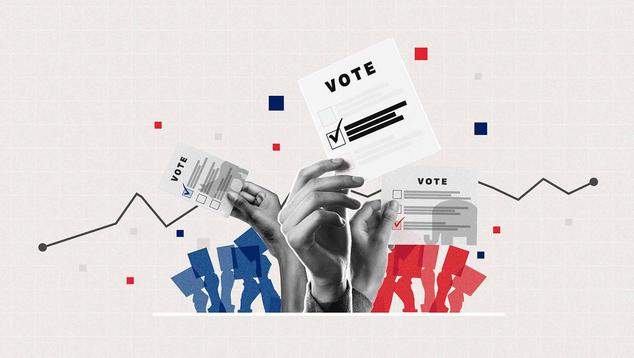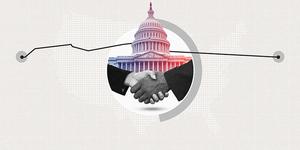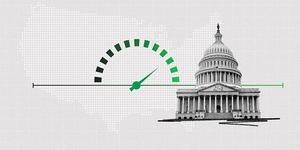WASHINGTON, D.C. — A solid majority of Americans continue to say a third major U.S. political party is needed, but several follow-up questions in a recent Gallup survey cast doubt on their commitment to supporting one.
While 55% of Americans say they are at least “somewhat likely” to vote for third-party candidates, only 15% say they are “very likely” to do so. But when asked how they would vote if a third-party candidate they preferred was unlikely to win, more Americans say they would change their vote rather than stick with that candidate. Additionally, nearly six in 10 Americans each are highly concerned that voting for a third-party candidate would result in them wasting their vote on a losing candidate or helping to elect their least preferred candidate.
Preference for Third Party Remains Historically High
Gallup’s annual Governance survey, which was conducted Sept. 2-16, finds 62% of U.S. adults saying the two major political parties are doing such a poor job that a third party is needed, essentially tied with the record-high 63% reading from 2023. Support for a third party has generally been near 60% since 2013.
Thirty percent of Americans currently take the opposing view that the two parties are doing an adequate job representing the American people. Only the 2013 reading of 26% was lower.
Historically, political independents have been more likely than Democrats and Republicans to say a third party is needed. This year, 74% of independents, 58% of Democrats and 43% of Republicans hold that view. Typically, Republicans’ and Democrats’ beliefs in the need for a third party have varied depending on whether their party controls the presidency. More partisans are supportive of a third party when the opposition is in power.
Younger Americans, who are more inclined to identify as political independents, also show greater support for a third party. About seven in 10 U.S. adults under age 50 favor a third party, compared with 61% of those between the ages of 50 and 64 and 48% of those aged 65 and older.
As might be expected, 83% of Americans who view both the Republican and Democratic Parties unfavorably think a third party is needed. But even 54% of those who view one or both of the parties favorably agree.
Americans Lack Strong Commitment to Third-Party Voting
A separate Gallup Panel web survey, conducted Sept. 2-15, asked a series of questions to try to understand Americans’ consistent preference for a third party and the inability of third-party efforts to become significant factors in U.S. elections. Overall, 55% of U.S. adults say they are very or somewhat likely to vote for a third-party or independent candidate in an election for president, Congress or governor. However, just 15% of Americans say they are very likely to do so.
Strong likelihood of voting for third-party candidates rises to 29% among political independents, compared with 9% of Democrats and 7% of Republicans.
Another question shows the struggle third-party candidates have in retaining supporters. When Americans are asked how they would vote if they thought a third-party candidate was the best person running but political experts, news reports or polls suggested that person had little chance of victory, 54% say they would switch their vote to the Republican or Democratic candidate. Conversely, 44% of U.S. adults say they would still back the third-party candidate.
Americans who indicate they are very likely to vote for third-party candidates, generally, are more likely to stick with a preferred third-party candidate in this scenario. Seventy-seven percent of these Americans would still vote for the third-party candidate even if the candidate was expected to lose. Thus, the most committed potential third-party voters — those very likely to vote for a third-party candidate and who would still do so if the candidate was unlikely to win — represent 11% of the U.S. adult population.
Concerns About Third-Party Voting Consequences
Most Americans express significant concern about the implications of voting for a third-party candidate. Fifty-seven percent are “extremely” or “very” concerned about wasting their vote on a candidate with no realistic chance of winning, and another 26% are “moderately” concerned.
Additionally, 59% of U.S. adults are extremely or very concerned about helping their least favorite candidate win the election, with another 23% moderately concerned.
Independents are less likely to have concerns about adverse consequences of voting for a third-party candidate, but almost half of them still do. Democrats are significantly more likely than Republicans to express concerns.
The youngest adults, those between the ages of 18 and 29, are also less inclined to worry about adverse outcomes of voting for a third-party candidate. Two-thirds of senior citizens fear possible negative consequences of casting a third-party vote.
Implications
Americans’ ongoing frustrations with one or both of the two major parties make the idea of a third party sound appealing. However, the prospects of a viable third party are dampened by soft support for third-party candidates, likely because Americans want their vote to matter in elections.
Although as many as 55% of Americans express a likelihood of voting for third-party candidates, many would readily abandon the candidates if it appeared they were unlikely to win the election.
While U.S. institutional structures like single-member districts and the Electoral College have long been cited as barriers to successful third parties, perceptual barriers held by voters may be just as difficult to overcome. Furthermore, the 11% of adults who appear to be most committed to voting for third-party candidates are not nearly enough to make such candidates competitive in elections.
Stay up to date with the latest insights by following @Gallup on X and on Instagram.
Learn more about how the Gallup Poll Social Series works. View complete question responses and trends (PDF download).




